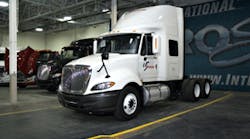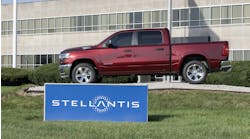CHATHAM, ONT. U.S. Foodservice has taken delivery of the first new International ProStar tractor at the International Truck and Engine Corp.’s truck plant here. The ceremonial delivery, which drew government, union and International executives, marks the culmination of a $300-million and five-year process to design a new Class 8 aerodynamic platform and transform the Chatham plant into a state-of-the-art facility, according to company officials.
Taking the keys to the truck, U.S. Foodservice vp of fleet Management Bernie Cassetori said: “I can’t wait for our drivers to get in and drive it.” Number 25 on the FleetOwner 500 list of top U.S. private fleets, U.S. Foodservice operates over 6,200 tractors and trucks delivering food and related supplies to restaurants, hospitals and other institutions.
The ProStar is the first of approximately 130 to 150 trucks U.S. Foodservice will buy this year with engines meeting the new 2007 diesel emissions standards, Cassetori told FleetOwner. “That’s fewer than normal since we’ve decided to wait a bit [on larger orders of ’07 engine vehicles], but we have to continue to buy because trucks get tired and have to be replaced.”
In addition to the new ProStar tractor, Cassetori said the fleet is interested in trying the International MaxForce heavy-duty diesel engine when it becomes available later this year. The fleet is also testing automated mechanical transmissions in 80 day-cab tractors purchased last year, he added.
Production versions of the new ProStar tractor began rolling off the Chatham assembly lines on January 29, according to Tom Baughman, International’s vp of heavy vehicles.
“When we began developing and designing the ProStar five years ago … our goal was to create a vehicle that delivers unparalleled driver satisfaction, a quality truck that is reliable with unprecedented uptime and provides the lowest cost of ownership,” he said at the plant ceremony. “Those goals are being realized as we hand over the keys.”



